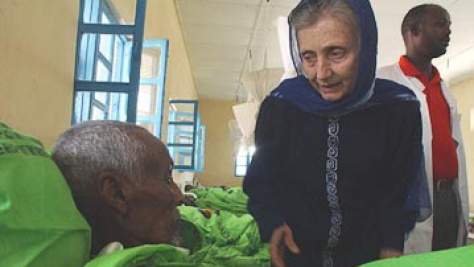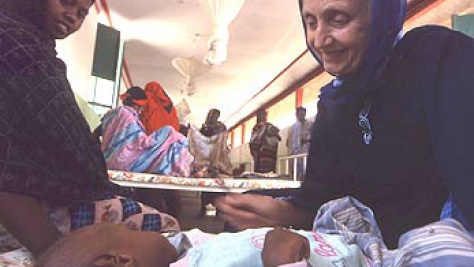Italian woman wins Nansen Refugee Award for work in Somalia
The UN refugee agency's annual award goes to Annalena Tonelli, an Italian woman who has spent more than three decades helping Somalis fight tuberculosis, AIDS, illiteracy, blindness, malnutrition and female genital mutilation.

Dr Annalena Tonelli tending to a Somali patient at her tuberculosis hospital in Borama. © UNHCR/E.Parsons
BORAMA, Somalia, April 15 (UNHCR) - In a forgotten part of the world, Annalena Tonelli has braved beatings, kidnapping, banditry and death threats to wage a one-woman battle against tuberculosis, AIDS, illiteracy, blindness, malnutrition and female genital mutilation.
For her 33-year solo campaign to help Somalis - many of them returned refugees and displaced persons - UN High Commissioner for Refugees Ruud Lubbers today announced that the 60-year-old Italian woman has been selected as this year's recipient of the Nansen Refugee Award.
The award, named after Fridtjof Nansen - the world-famous Norwegian polar explorer and the world's first international refugee official - was created in 1954 to honour individuals or organisations that have distinguished themselves in work on behalf of refugees. The award includes $100,000 for a refugee project of the recipient's choice.
"I have always tried to stay hidden, and refused any publicity," says Dr Tonelli at her hospital in Borama, in north-western Somalia, also known as Somaliland. But she decided to accept the Nansen Award in hopes of refocusing the international spotlight on the chronic problems of Somalia, long since overshadowed by other world hotspots.
Dr Tonelli - or Annalena as she is known to her patients and most who come in contact with her - is living proof that one person can make a difference in the world. Turning her back on any organisation, she has always worked independently, raising cash on her own to fund her many medical projects helping Somali nomads.
"Maybe you have heard of Dr Tonelli, but we here in Borama feel directly every day what she is doing," says the mayor of the town, Abdilhman Sheikh Omar.
A slim woman with grey hair pulled into a bun and covered modestly with a shawl, Dr Tonelli radiates energy and charisma as she bustles about her hospital, consulting with her Somali physicians and listening attentively to the needs of her patients. Since the age of 18, she has trained herself to sleep only four hours a night in order to have more time for her causes.
A devout Roman Catholic, she says she has known since the age of five that she wanted to dedicate her life to helping others. After taking a law degree in her native Italy to please her strict parents, she took up teaching in north-eastern Kenya, an area populated by ethnic Somalis.
It was there that she saw the devastation wreaked by tuberculosis (TB), which often went untreated and led to social ostracism, gruesome deformities and finally a painful death.
"The moment I saw TB patients, I fell in love with them and it was for life," she says with a radiant smile. (She is obviously drawn to the causes most people would shun, and sounds completely convincing when she says things like: "I am in love with the sick people.")
She earned diplomas in tropical medicine, community medicine, control of tuberculosis and control of leprosy in order to better carry out what she saw as her true calling. She says she has never had a problem not being a physician. She clarifies that she practices "the control of tuberculosis," not medicine, and has a number of trained doctors on her staff at her TB hospital in Borama. (And in any case, say long-time Somalia hands, she is better qualified than many of the people running hospitals in the country, who may only have a nursing certificate.)
In the 1970s, a new drug made it possible to treat TB in six months, rather than 12 to 18 months, which had been the standard before. Dr Tonelli pioneered the "short-course" TB treatment in Africa, an approach that has since been adopted as a model by the World Health Organization (WHO).
A common problem with treating TB patients is that they usually stop taking medication at the first sign of improvement - with the result that they have relapses and the disease becomes more drug-resistant. Dr Tonelli's innovation was forcing the Somalis to live under her roof until they were truly cured. At her clinic in Borama, she claims a cure rate of 96 percent, thanks to the fact that all patients must take their medicine in front of a doctor; any outpatients who fail to show up are tracked down and convinced to continue the treatment.
Forced to leave Kenya in 1984 after she stepped in to halt a government-ordered massacre in Wagalla (Wajir district) of many of her Somali friends and patients, she later settled in Somalia. Working in Mogadishu during the civil war, she supplied food to thousands of starving residents of the capital. She later worked in Merca, in southern Somalia, again treating TB patients, until repeated beatings and other physical violence against her forced her to flee. (The doctor she trained to replace her was killed a little over a year after Dr Tonelli left.)
Undaunted, she responded to a request by WHO to continue her fight against TB. Together, she and the organisation decided on Borama, in relatively peaceful Somaliland. "I started from zero with no support except TB drugs provided by WHO," she said. Today her TB hospital treats 200 inpatients and 200 outpatients every day.
In Borama, a desert town with no paved roads, she lives a simple life, or a life of "radical poverty," as she calls it. She says she is more effective if she lives the same life as her patients.
She has no possessions. She owns two garments - long caftans - and points out that her sandals were given to her by a patient and that the scarf she uses to cover her head in the Somali way was given to her by her staff. She eats the same simple food as her patients - often rice and beans, or traditional maizemeal with vegetables.
But don't assume this way of life is a sacrifice. "When people talk of sacrifice, I really laugh," she says. "There's no sacrifice. It's pure happiness. Who else on earth has such a beautiful life?" she asks with glee in her voice. She adds, "God has given me the capacity of going through every problem. I never had a crisis."
She does, however, admit to facing frustrations every day because of lack of money. Her status as an individual makes it difficult for her to raise money. Her Borama clinic - and the other activities she has branched out into - cost her $20,000 a month, including $7,000 for salaries for 75 employees. It is all raised from friends and well-wishers, though UNHCR has helped by building her eight TB wards for the hospital and classrooms for the school of the deaf.
Making the rounds of the TB wards, Dr Tonelli, who speaks fluent Somali, greets her patients like old friends, cuddling the children who affectionately call her "grandmother." A 39-year-old patient whose arms and legs had contracted into a foetal position for a year, proudly takes a few steps to show how Dr Tonelli's treatment has restored her to health. Another woman, who was brought here in a coma, says the progress she has made in the hospital is a "miracle."
From treating TB, Dr Tonelli has branched out into treatment and prevention of HIV/AIDS, which weakens sufferers and makes them susceptible to TB. She set up a school for deaf and disabled children and sponsors the visit twice a year of surgeons from a German charity who have restored vision to 3,700 people whose eyes had clouded over with cataracts. She is also passionate about the fight against female genital mutilation and says she has persuaded nearly all the traditional circumcisers in Borama to give up the practice and join her campaign.
Despite her long service to the Somalis, Dr Tonelli makes it clear she is not in love with the Somalis so much as she is in love with the poor and suffering. "Tomorrow if I have to leave Somalia, I will help people who suffer somewhere else," she says quietly. "The world is full of people who suffer."
By Kitty McKinsey in Borama, Somaliland
Related news and stories
Venezuelan refugees, migrants, and their hosts need help to chart a brighter future
Venezuelan medical professionals step in to fill healthcare gaps in Peru
Child's joy helps Syrian refugee family weather Lebanon's economic crisis
Indigenous community in Uganda seeks an end to their statelessness
Merkel says Nansen prize honours all those who welcome refugees
Iraqi doctor provides care and comfort to Yazidi survivors
Your search for « annalena tonelli » matched 34 results. Displaying page 1 of 4 pages.
-

UNHCR mourns death of Dr. Annalena Tonelli
6 Oct 2003 ... Geneva/Nairobi - UN High Commissioner for Refugees Ruud Lubbers today expressed grief at the murder Sunday night of Annalena Tonelli, a 60-year-old humanitarian worker who had dedicated the last 33 ...... -

Memorials set for Dr. Annalena Tonelli
10 Oct 2003 ... UNHCR will be represented at two memorial services that are scheduled for early next week in honour of Annalena Tonelli, the longtime aid worker in Somalia and this year's Nansen Refugee Award winner ...... -

Mourners remember Dr. Tonelli, pledge to continue her work
14 Oct 2003 ... NAIROBI/GENEVA, Oct 14 (UNHCR) - Thousands of mourners around the world have come together this week to remember murdered aid worker Annalena Tonelli, and pledged to continue the work she had started ...... -

2003 Nansen Refugee Award to Italian humanitarian
15 Apr 2003 ... 15 April 2003 NAIROBI/GENEVA - Annalena Tonelli, an Italian woman who has devoted more than three decades to helping Somalis in remote corners of the Horn of Africa, has been named this year's Nansen ...... -

Italian woman wins Nansen Refugee Award for work in Somalia
15 Apr 2003 ... BORAMA, Somalia, April 15 (UNHCR) - In a forgotten part of the world, Annalena Tonelli has braved beatings, kidnapping, banditry and death threats to wage a one-woman battle against tuberculosis, ...... -
Statement by Mr. Ruud Lubbers, United Nations High Commissioner for Refugees, on the occasion of the award of the Nansen Refugee Award for 2003 to Dr. Annalena Tonelli, Geneva, 25 June 2003
25 Jun 2003 ... Cette année la Distinction est décernée au Docteur Annalena Tonelli pour son travail en faveur des déshérités de Somalie, souvent des personnes déplacées ou rapatriées. Pendant 33 ans, elle a ...... -

Nansen Award helps Italian aid worker "be a stronger voice for a people who have no voice"
26 Jun 2003 ... GENEVA, June 26 (UNHCR) - Italian charity worker Annalena Tonelli on Wednesday received the 2003 Nansen Refugee Award at a Geneva ceremony attended by more than 200 dignitaries, among them the ...... -

UNHCR mourns loss of award-winning aid worker
6 Oct 2003 ... NAIROBI, Kenya, Oct 6 (UNHCR) - The UN refugee agency today expressed shock and sadness over Sunday's brutal murder of Dr Annalena Tonelli, an Italian humanitarian worker who had dedicated her life to ...... -

Lubbers to present the Nansen Refugee Award
24 Jun 2003 ... GENEVA - UN High Commissioner for Refugees, Ruud Lubbers, on Wednesday, June 25, will formally present this year's Nansen Refugee Award to Italian charity worker Annalena Tonelli. The award ceremony ......



